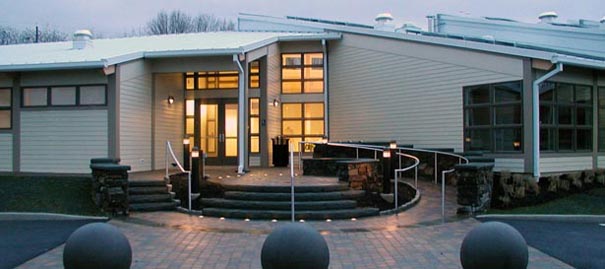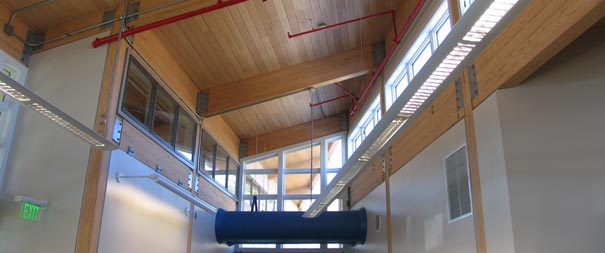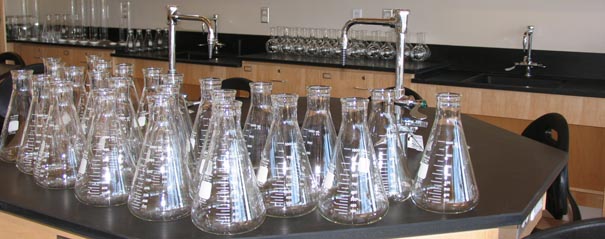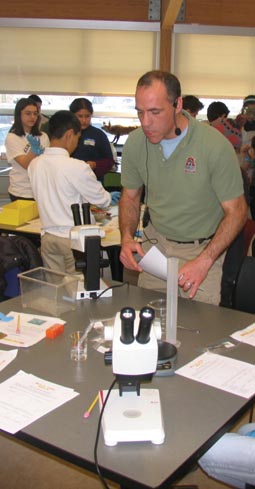
The NJSEA Center for Environmental and Scientific Education provides increased educational opportunities and experiences for the more than 40,000 residents, tourists and students who visit the Meadowlands Environment Center (MEC) every year.
The 10,000 square foot building is an expansion of the MEC. Established in 1982, the MEC is operated by Ramapo College of New Jersey. The MEC provides a diverse lineup of environmental activities and workshops as well as a comprehensive environmental educational program for students in grades K through 12. The MEC education programs teach children about the value of the Meadowlands, incorporating hands-on educational instruction, which supplements core curriculum content standards taught in our schools.
The idea for the new Center began when members of the NJSEA staff visited a private school in Somerset County designed using U.S. Green Building Councils Leadership in Energy and Environmental Design (LEED) principles. The NJSEA decided it would be a worthwhile endeavor to provide this type of learning environment where staff could incorporate green building elements into the curriculum and bring this special environment to children within the Meadowlands District and beyond.
The Center is a strong example of how the NJSEA has become a leader in green building design. It contains several classrooms, science labs and a multipurpose room, and will play a major role in the MEC green building practices curriculum. The William D. McDowell Observatory, as well as the Center’s classrooms and labs, has received LEED Platinum Certification.
The Center for Environmental and Scientific Education will serve as an example for municipalities and businesses in the District that seek to incorporate green building practices in their own projects. The NJSEA’s commitment to green building is also demonstrated through its regulations, which offer incentives to developers and property owners in the Meadowlands District who build to LEED standards.

THE CENTER AS A GREEN SCHOOL
In keeping with the NJSEA’s commitment to renewable energy and environmental stewardship, the children who utilize the center will learn through example by seeing how this building works to be energy efficient and environmentally friendly. LEED emphasizes state-of-the-art strategies in six areas:
SUSTAINABLE SITE DEVELOPMENT
NJSEA Landscape Architects developed an overall landscape layout incorporating the grounds of Richard W. DeKorte Park with its sustainable landscaping featuring plants native to the region.
WATER SAVINGS
- • Infrared sensors on bathroom sinks
- • Use of low-flow toilets and fixtures and waterless urinal for water use reduction
ENERGY EFFICIENCY
- • 165 rooftop solar panels to generate electricity for the building’s power needs
- • Motion-sensitive lighting controls that automatically shut off lights when rooms are not in use
- • Solar tubes in the ceiling to allow natural light to come into the Center and reduce reliance on traditional power sources

MATERIALS AND RESOURCES SELECTION
- • Use of Forest Stewardship Council (FSC) certified wood
- • The Center’s design includes the use of recycled and specialized building materials
- • Use of materials extracted, processed, and manufactured regionally
- • Use of low-emitting volatile organic compound (VOC) building materials
INDOOR ENVIRONMENTAL QUALITY
- • Energy-efficient heating, ventilation and air-conditioning systems
- • Fume hood in Chemistry Lab
INNOVATION AND DESIGN PROCESS
- • LEED Accredited Professional Advisor
- • Green housekeeping program will utilize only environmentally friendly cleaning supplies
- • Educational Outreach Programs
- • Exemplary performance for on-site renewable energy
- • Exemplary performance for projected water savings

EDUCATION AT THE CENTER
The Center for Environmental and Scientific Education, in conjunction with the Meadowlands Environment Center, will provide a comprehensive environmental education for schools and the general public.
Environmental Educational programming spans the spectrum of K-12, undergraduate, graduate and continuing education. There are also programs for people living with disabilities, providing participants with hands-on educational opportunities within the core sciences and astronomy.
Ramapo educators teach the K through 12 programs, which meet New Jersey Core Curriculum Content Standards, providing a valuable supplement to the student’s education. Students have the opportunity to study ecology, chemistry, biology, physics, natural history and geology. Outdoor field-based lessons centered on the New Jersey Meadowlands marsh ecosystem inspire awareness and stewardship of the Meadowlands and its wildlife. Students observe plants and animals specific to our environment which in turn fosters an interest in science and increases their scientific literacy. Those who utilize the Center for Environmental and Scientific Education will learn by example how the building works to be energy efficient and environmentally friendly.